Wanna be hackers, code crackers, slackers
Remaking System Shock was always a risky proposition. Even as a fan of Nightdive Studio’s work on game preservation, I wasn’t sure they could pull it off. Normally, their approach is to simply port games to modern hardware, sometimes fully transplanting them to their Kex Engine. Fully remaking a game, though? Hm.
It’s not that System Shock isn’t in need of a remake, either. Much like many PC games of its time, it’s extremely unfriendly. It’s not necessarily a difficult game, but the learning curve isn’t just steep; it’s also covered in dish soap and broken glass. Even Nightdive’s previous System Shock: Enhanced Edition doesn’t really manage to soften its disposition.
However, System Shock’s obtuse systems also served a greater purpose. Even today, it’s a much more tactile and effective game than many modern titles. If you soften it too much and sand off all the rough edges, you run the risk of losing that and, as a result, losing what makes it special.
The solution to this problem is both elegant and decidedly Nightdive.
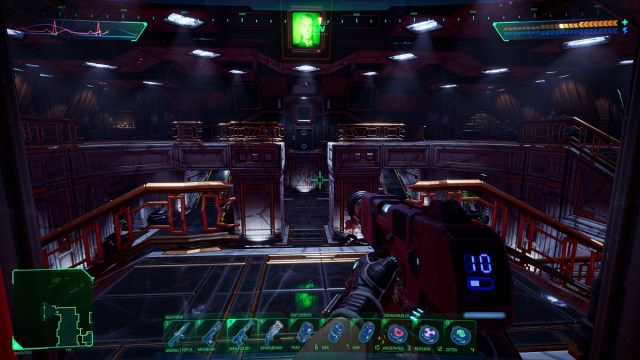
System Shock (PC [Reviewed], PS4, PS5, Xbox One, Xbox Series X|S)
Developer: Nightdive Studios
Publisher: Prime Matter
Release: May 30, 2023 (PC), TBA (Console)
MSRP: $39.99
System Shock tells the story of a future hacker who finds his balls put in a vice by TriOptimum Corp. He’s given a deal where, if he assists a crooked executive in removing the ethical constraints on the AI of a space station, he’ll be outfitted with some military-grade cyber dealies.
What a quaint notion: AI with ethical constraints. As if.
While the hacker’s cyber-bod is healing, the AI, SHODAN, turns predictably evil and begins turning everyone on the station into cyborgs, mutants, or corpses. When the hacker wakes up, he finds himself trapped on the station with monsters and an AI that is a cross between Santa Claus and your Mom. That is to say, she’s always watching and doesn’t think too highly of you. SHODAN has various plans for humanity, and none of them are good, so beyond just escaping from Citadel Station, you should probably stop her. This is kind of your fault anyway.
What kinda chip you got in there, a Dorito?
The opening is completely changed, and it’s one of the parts that’s overhauled for the better. Rather than just watching a cutscene, you’re dropped into the hacker’s eyesockets right after the opening credits. It’s a rather detailed prologue that isn’t much different than just watching a cinematic, but it gives you more insight into the character you’re playing.
One of the biggest questions I had going into the remake was how they were going to handle the level design. First-person shooters in 1994 weren’t the best at capturing realistic environments, and while System Shock did a better job than, say, Doom, the levels are still more akin to mazes than a habitat where people live and work.
Nightdive didn’t do much to address this. There are definitely changes, especially ones that make the station feel a bit more believable, but the maze-like layout remains. There’s an article of lore that tries to explain the inhuman layouts, but it’s important to keep in mind that it’s more of a dungeon than a space station.
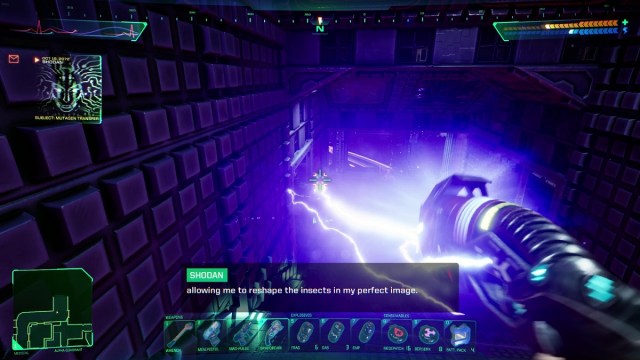
In a 32-bit world, you’re a 2-bit user
For that matter, in preserving a lot of what made the original great, Nightdive didn’t touch many of the more unfriendly features. Enemies still respawn, and while I don’t have any actual hard data on this, they seem to spawn less.
More importantly, though, is that System Shock subscribes to the same revival system that the later spiritual sequel, Bioshock does. That is to say, if you die, you just respawn elsewhere on the floor. The difference is that you first need to turn off the “Cyborg Conversion” that SHODAN converted the restoration bays into. If you haven’t done that, you’ll be respawned on a previous floor if you’re lucky, but often you’ll see a traditional “game over” screen.
So, when the restoration bay is active, you just get back up and do a walk of shame back to where you died with no penalty. That may make it sound like System Shock is really easy, and that’s only partially true. System Shock makes it easy to continually make progress, but you’ll still probably see the game over notification way more than you’d like to. Often, the restoration gets disabled, especially during boss battles, so you’ll want to get acquainted with the quicksave key. The gruesome cutscene, a reproduction of the animation in the original, is unskippable. Or it was in the build I was provided.
Combat isn’t particularly difficult, but the hacker is very squishy. There are various ways you can alleviate this, like a shield, but it drains from your battery, which you might need for any of the many other activities that require the battery.
On the other hand, the AI isn’t much improved over the original, but considering all the enemies are either robots or cyborg zombies, it fits.
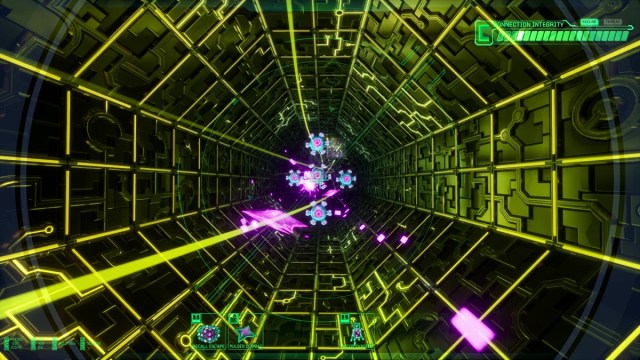
Where’d you get your CPU? In a box of Crack Jacks?
Nightdive went well out of its way to preserve what made the original so genuinely great. Many of their features, like the changes to the access panel mini-games and the overhaul of cyberspace, don’t feel so much like changes as they do expansions. Those concepts fit into the world in a way that feels like an enhancement rather than an attempt to “fix” something.
Some features were pulled from System Shock 2 but probably less than you’d think. The inventory, for example, feels more like the sequel than the original, but it’s one of the few changes that give the remake a more modern twist.
Yet, all the mechanics that made the original System Shock feel more satisfying than a modern shooter are still there. It’s still one of the pioneering immersive sims, meaning it drops you into the environment, gives you a set of rules, and leaves it to you to figure things out. This can mean backtracking (more than you’ll probably like), but it also means that progress is always rewarding and feels earned.
Quite a few mechanics were given a more tactile feel to them. Picking up audio logs and keycards come with new animations that actually have a lot of personality to them. Having a sort of “presence” in the game world is sort of cornerstone of the immersive sim genre, and it’s obvious that Nightdive is aware of that and incorporated it as part of their modernized features.
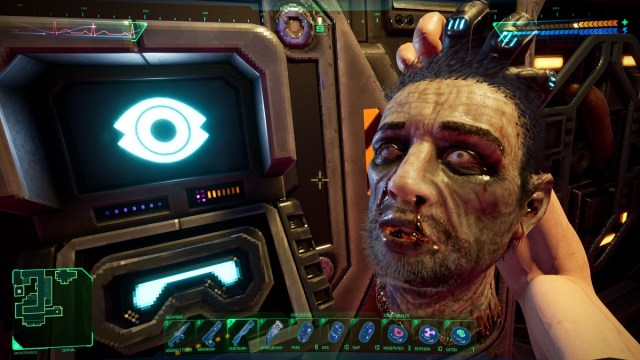
If I ever meet you, I’ll ctrl+alt+delete you
Before summarizing my experience, I feel it’s important to note that the System Shock remake has a curious aesthetic choice. Most of the textures are extremely pixelated, and originally I thought this was because of a flaw in my configuration. However, this was apparently by choice, and it’s extremely strange. I’m someone who prefers the look of classic, unfiltered textures over the blurry smudges of filtered ones, but System Shock kind of lands in an in-between place. The lighting and reflections are all detailed, but then there are pixellated textures. Not entirely unappealing, but I don’t get it.
System Shock is an experience that doesn’t lean on artificial set-piece moments to try and control its pacing. SHODAN is simply an omnipresent antagonist rather than a physical threat. Or rather, she’s constantly a physical threat as you are in her very being. It creates a flow and atmosphere that are difficult to achieve. System Shock is the perfect nexus between design and narrative choices.
Nightdive has proven once again that they fully understand what made the classics so indispensable. Their reverence for the source material pays off, as while the System Shock remake is better tailored to modern tastes, it still has everything that made it special in its 1994 release. You do have to go in with the understanding that its old bones are still there, but if you bounced off the convoluted interface of the original, you’ll have a better chance of acclimating here. It’s really just the definitive version of a classic game, and it deftly demonstrates why Nightdive is the master of preservation.
[This review is based on a retail build of the game provided by the publisher.]

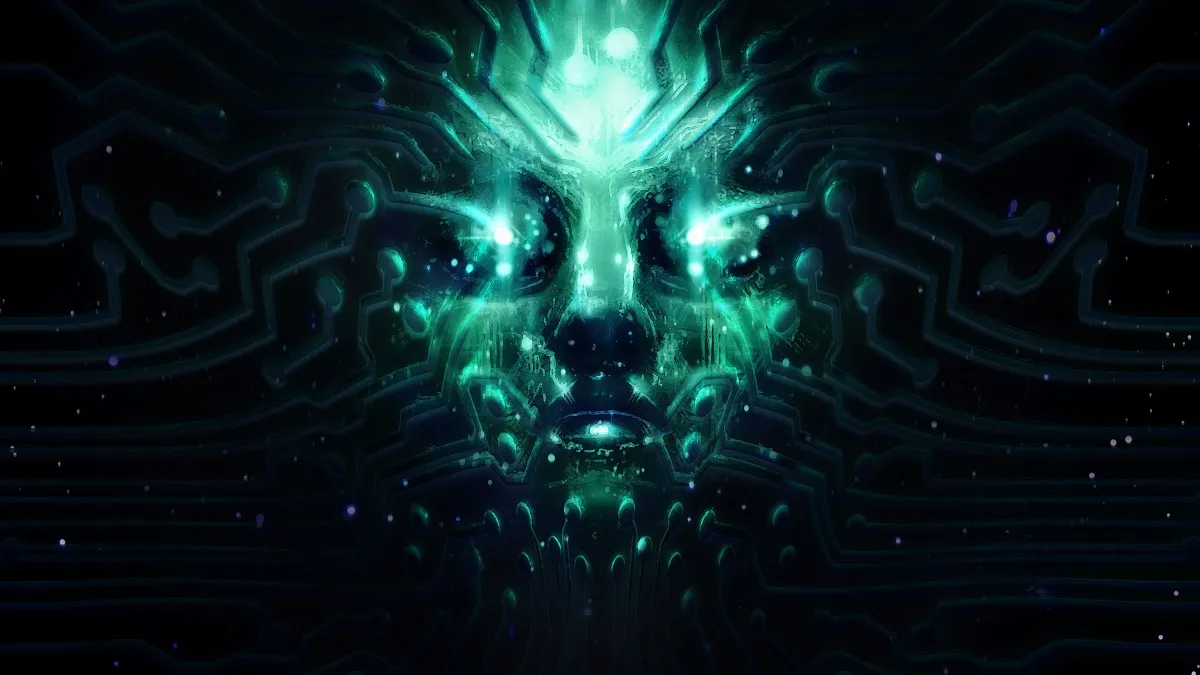




Published: May 29, 2023 10:28 am